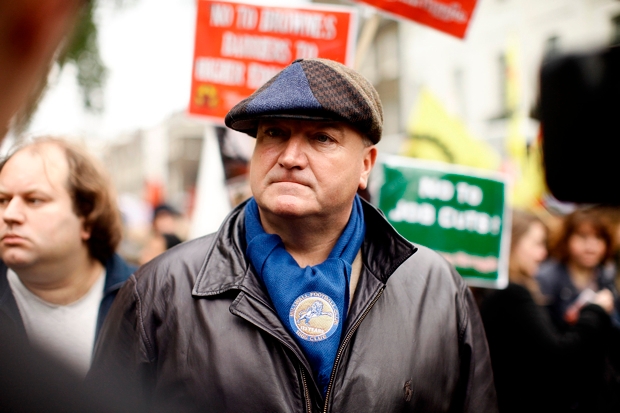Shortly after Bob Crow’s death was announced on Tuesday, Nigel Farage sent the following tweet: ‘Sad at the death of Bob Crow. I liked him and he also realised working-class people were having their chances damaged by the EU.’
Cue a predictable storm of Twitter outrage. Farage was attacked for trying to make political capital out of Crow’s death. The following tweet, from the ex-FT journalist Ben Fenton, was typical: ‘Bit off-key for @Nigel_Farage to link a tribute to Bob Crow to his own anti-EU rhetoric, I think.’
Now, some of those criticising Farage had a political axe to grind. They were claiming Farage had broken an unwritten rule that they clearly don’t believe in themselves. I wonder how many of those same people attacked Bob Crow for saying he hoped Margaret Thatcher would ‘rot in hell’ just after she died? Not many, I suspect. In other words, they were guilty of precisely the same lapse in taste — using someone’s death as an excuse to promote their own agenda — as they were accusing Farage of.
To be fair, I don’t suppose many of them were conscious of this double standard. Hypocrisy is often described as ‘blatant’, but it’s rarely obvious to the hypocrite. On the contrary, the reason it’s so common is because people aren’t aware they’re engaging in it. Expressing moral disapproval produces such a pleasurable ripple of self–satisfaction that people rush to judgment without bothering to reflect on whether they’re guilty of the same sin. And it’s not just those on the left. One of the custodians of public decency who was affronted by Nigel Farage’s tweet was Tom Newton–Dunn, the political editor of the Sun.
Death is particularly good at bringing out people’s inner Mary Whitehouse. I ran up against this when I wrote an unflattering blog post about the fashion designer Alexander McQueen shortly after he died. Nothing I’ve ever written has provoked such a tidal wave of hostility. It wasn’t the substance of the piece that bothered people, but the fact that I’d written it when his corpse was still warm. In their eyes, I’d broken some cardinal rule. Not ‘don’t speak ill of the dead’, but don’t speak ill of them until at least 24 hours have passed. And the people who were most furious with me for failing to observe this edict were bohemians, homosexuals, drug addicts — exactly the sort of people who prided themselves on ignoring society’s ‘bourgeois’ conventions in virtually every other arena. When it comes to death, most people are conservative with a small ‘c’.
You become acutely aware of this when someone close to you dies. Everyone you come into contact with treads on eggshells, and not just because they don’t want to upset you. They’re also incredibly anxious to observe the correct protocol. Indeed, their sense of propriety becomes so overdeveloped that they’re not afraid to criticise you for behaving inappropriately. I remember bumping into a young woman at the Spectator party soon after my mother died. Following the ritual expressions of sympathy, she said, ‘Should you be here?’ The implication was clear. I should have been at home, rending my garments, not gallivanting about in Westminster.
To complicate matters, people are often a bit fuzzy about what the rules are when it comes to death. This means they find themselves in the uncomfortable position of desperately wanting to behave ‘correctly’, but not quite knowing what the form is — like a middle-class couple at a posh dinner party. So they overcompensate by aggressively accusing you of breaking the code: ‘Should you be here?’
I think the reason death has this effect on people is twofold. First, it’s a taboo subject, not something you want to think about. That means that when someone dies you feel a bit at sea. You don’t trust your natural reactions so you fall back on what you think the etiquette is instead. And you attach more significance to these social niceties than you normally would because you have no other guide ropes.
Secondly, I think the tut-tutting about other people being ‘off-key’ and so forth is really just an expression of their horror at the very fact of death. Unconsciously, they cannot help but think of their own demise, and one way to keep the grim reaper at bay is through a display of aggression. In this case, Bob Crow’s untimely death was an unwelcome reminder of our mortality. Some people reacted by pummelling the nearest punching bag, and that happened to be Nigel Farage.






Comments